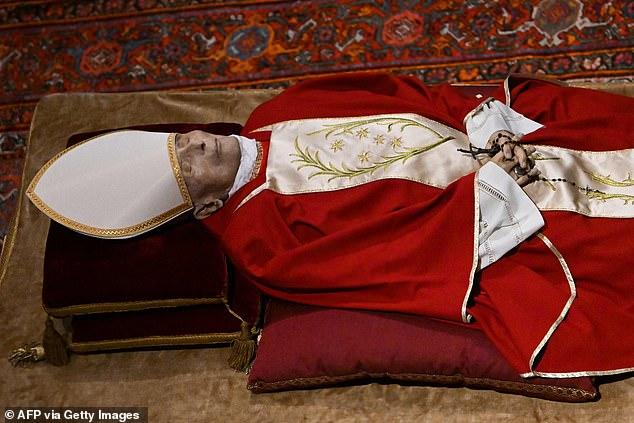Pope Francis’ funeral marked a poignant conclusion to the life of a leader whose moral leadership has deeply influenced global dialogues around compassion and justice. Held in the heart of Vatican City, the funeral ceremony drew an unprecedented assembly of 40,000 faithful in St. Peter’s Square and an additional 250,000 on the streets, all paying tribute to his enduring legacy. Cardinal Giovanni Battista Re delivered a powerful homily, urging attendees to “build bridges, not walls,” a phrase synonymous with Pope Francis’ advocacy for the marginalized and his relentless fight against inequality. His calls for peace reverberated globally as world leaders, including President Donald Trump, gathered to commemorate a Pope who tirelessly championed the voiceless. This significant event was not only a farewell but also a reaffirmation of the values Francis embodied, prompting reflection on how his legacy will shape future Vatican City events and the direction of the Church.
The passing of Pope Francis has initiated a profound reflection on his influential tenure and the enduring impact of his teachings. His funeral ceremony served as a unifying moment for individuals across diverse backgrounds, celebrating the life of a pontiff who was renowned for his humility and moral clarity. The gathering included a global representation of leaders, dignitaries, and ordinary citizens who all shared a common respect for Francis’ initiatives surrounding human dignity and social justice. Key figures such as Cardinal Giovanni Battista Re honored his legacy by reiterating the pope’s calls for compassion and solidarity, themes that resonated deeply during the solemn proceedings. This farewell was less about mourning and more about recognizing a pivotal chapter in the moral discourse that Francis fostered within the global community.
The Legacy of Pope Francis: A Moral Compass
Pope Francis, during his tenure, became a beacon of moral leadership for millions around the globe. His legacy is intricately woven with his compassion for marginalized communities, and his poignant words served as a moral compass that guided many through turbulent times. By consistently advocating for peace and understanding, he managed to touch the hearts of those who felt overlooked and unheard. His endeavors to build bridges rather than walls left a profound impact that will resonate for generations.
Moreover, his approach to issues like climate change, economic inequality, and refugee rights defined a significant part of his papacy. In an age marked by political strife and social division, Pope Francis’ calls for unity and compassion urged people not only to reflect but also to act. The moral dilemmas presented during his funeral, highlighted by Cardinal Giovanni Battista Re, continue to challenge global leaders to reconsider their stances and practices in light of Francis’ teachings.
Pope Francis’ Funeral: A Ceremony Reflecting His Humanity
The funeral of Pope Francis was a poignant reflection of his life dedicated to humility and service. Instead of the customary ornate burial options utilized by previous popes, he chose a simple wooden casket—an emblem of his unpretentious nature. This choice resonated deeply with attendees and showcased the values he embodied throughout his papacy. Hundreds of thousands gathered in Vatican City, illustrating the profound impact he had on people from all walks of life.
Cardinal Giovanni Battista Re’s powerful homily during the ceremony highlighted key themes of Pope Francis’ life’s work, reminding everyone of the importance of compassion in leadership. By inviting world leaders into a space of mourning, it became a unique moment for discourse on collective responsibility and moral leadership. His funeral was not merely an end but a continuation of Francis’ vision for a more equitable and peaceful world.
Vatican City Events: A Gathering of Leaders at a Pivotal Moment
Pope Francis’ funeral drew an unprecedented assembly of global leaders, marking a significant event in Vatican City. Among those present were influential figures such as President Donald Trump, Ukraine’s President Volodymyr Zelenskyy, and various dignitaries, demonstrating that even in mourning, the urgency for dialogue and resolution remains. The funeral served as a pivotal moment for these leaders to reflect on their roles in addressing the pressing issues that the world faces today.
As the ceremonial events unfolded, discussions about future directions in moral leadership emerged. Zelenskyy’s remarks about his interaction with Trump post-funeral underscored the need for cooperation and conversation, upholding the very essence of Francis’ teachings. This assemblage of leaders in a time of grief acted as a catalyst for potential change, echoing the pope’s desire for a united front against division and strife.
The Calls for Unity and Compassion in Modern Politics
Pope Francis frequently emphasized the need for unity and compassion, qualities often overshadowed by modern political landscapes. His homily, delivered by Cardinal Giovanni Battista Re, echoed these core tenets while challenging the status quo. In a world torn apart by discord, Francis’ messages reiterate the importance of building relationships based on mutual respect rather than division. This approach resonates deeply within contemporary society’s quest for ethical leadership.
By fostering an inclusive dialogue, especially in the face of political tension, Pope Francis advocated for a new paradigm of leadership. His funeral, imbued with these themes, stands as a reminder for leaders around the world to not only acknowledge their power but to wield it with a sense of responsibility and compassion, striving to create neighborhoods, nations, and a world that truly reflects the values of humanity.
The Influence of Pope Francis on Human Rights Advocacy
Throughout his papacy, Pope Francis became synonymous with human rights advocacy, relentlessly promulgating messages of justice for the marginalized. His influence on global issues such as immigration, poverty, and climate action exemplified his commitment to human dignity. The thousands of attendees at his funeral included individuals from various marginalized communities, emphasizing the profound connection he fostered with those often forgotten by society.
Pope Francis’ commitment to advocating for the disenfranchised was evident in the way he highlighted their struggles and voices throughout his time as pope. His funeral, therefore, served as a powerful platform for reminding attendees of their moral and ethical obligations toward humanitarian efforts. As world leaders pay tribute to his legacy, it is crucial they embrace the same passion for justice and equality that Francis championed.
A Reflection on Pope Francis’ Teachings
Reflecting on Pope Francis’ teachings reveals a rich tapestry of values centered around peace, love, and inclusion. His proclamations urged followers to confront societal issues with compassion rather than condemnation. This approach was reflected in the homily at his funeral, which served not only as a tribute but as a clarion call for all to continue the fight for a world steeped in mercy and understanding.
The essence of his teachings encourages a shift towards restoring moral clarity in societal discourse. Whether addressing global conflicts or local communities, Pope Francis sought to inspire change through empathy and action, reminding the world that true leadership is a commitment to serve. As we remember him, the challenge remains to embody these values in our daily lives and governance.
Impact on Global Peace Initiatives
Pope Francis’ legacy is steeped in a commitment to promoting global peace, often stressing the futility of war. His firm belief that “war always leaves the world worse than it was before” profoundly shaped his discourse on international relations. At his funeral, figures like Zelenskyy and Trump gathered—two leaders at the core of pivotal conflicts—underscoring the urgency for peace initiatives inspired by Francis’ teachings.
The call for dialogue during his funeral highlights a crucial point: that peace is a shared responsibility requiring collective efforts from all leaders. As nations grapple with complex conflicts, the lessons imparted by Francis urge leaders to prioritize human dignity over political advantage, fostering an atmosphere conducive to peace and cooperation.
Continuing Pope Francis’ Vision
Following the funeral, the question on many lips remains: who will uphold the vision set forth by Pope Francis? His legacy is one that advocates for progress and compassion in leadership. As the world seeks a new pope, the expectation that his successor will embody these values presents a challenge but also an opportunity for meaningful change.
It is crucial for those in positions of power to reflect on Pope Francis’ teachings and the urgency for a global community that is more just and inclusive. The influence of his moral leadership needs to carry on into the future, ensuring that the conversations initiated during his papacy continue, fostering growth and hope in a world marked by division.
The Role of Moral Leadership in Today’s Society
The concept of moral leadership is exemplified in Pope Francis’ actions and teachings. Today, as political landscapes shift and transform, the need for leaders who embody integrity, compassion, and empathy has never been more pressing. His approach to moral leadership urges modern-day politicians to prioritize the well-being of their constituents above political gain.
Cardinal Giovanni Battista Re’s reflection on building bridges rather than walls emphasizes the critical need for leaders to foster connections, not only in politics but across societal divides. In the wake of Francis’ passing, the demand for moral courage in leadership is a burden that all should heed—advocating for a just world aligned with the principles promoting peace and compassion.
Pope Francis and the Future of the Papacy
As the world processes the passing of Pope Francis, there is a simultaneous contemplation of what his legacy means for the future of the papacy. He redefined the role of the pope, creating a more relatable and visibly compassionate church leader. The choices made by his successor will be critical in determining whether the progressive and inclusive dialogue initiated by Francis will continue.
The legacy of Pope Francis encourages reflection on the responsibilities held by the Catholic Church today. As the new leader emerges, there is hope that the values of humility, service, and advocacy for those in need will underpin his pontificate, ensuring that the teachings of Francis endure and inspire future generations.
Frequently Asked Questions
What significant themes were highlighted during Pope Francis’ funeral ceremony?
During Pope Francis’ funeral ceremony, key themes included moral leadership, compassion, and inclusivity. Cardinal Giovanni Battista Re emphasized the importance of ‘building bridges, not walls,’ reflecting Francis’ advocacy for refugees and marginalized communities. His funeral served as a reminder of his legacy of peace and social justice.
Who delivered the homily at Pope Francis’ funeral and what was its main message?
The homily at Pope Francis’ funeral was delivered by Cardinal Giovanni Battista Re. The main message urged attendees to ‘build bridges, not walls,’ reinforcing Francis’ enduring commitment to moral leadership and his focus on addressing the plight of the poor and marginalized.
How did Pope Francis’ funeral reflect his legacy and influence on modern politics?
Pope Francis’ funeral reflected his legacy through its emphasis on moral leadership and humanitarian values. With a significant turnout of world leaders and attendees, including President Trump, the ceremony highlighted the importance of Francis’ messages on peace, compassion, and social justice in a politically divided world.
What distinguished the burial of Pope Francis compared to previous popes?
Unlike previous popes who were buried in ornate nested coffins, Pope Francis chose to be interred in a simple wooden casket lined with zinc. This decision exemplified his humility and commitment to a life dedicated to serving others rather than seeking personal grandeur.
What role did marginalized communities play at Pope Francis’ funeral?
Marginalized communities, such as prisoners, migrants, and the homeless, were prominently included at Pope Francis’ funeral. This emphasis reflects the late pope’s lifelong advocacy for those often overlooked by society, reinforcing his legacy of inclusivity and compassion.
How many dignitaries attended Pope Francis’ funeral, and who were some notable figures?
Pope Francis’ funeral was attended by approximately 170 heads of state and dignitaries, highlighting his global influence. Notable figures included President Donald Trump, Ukraine’s President Volodymyr Zelenskyy, French President Emmanuel Macron, Brazilian President Luiz Inácio Lula da Silva, and Britain’s Prince William.
How did the funeral ceremony serve as a platform for contemporary discourse?
The funeral ceremony for Pope Francis served as a vital platform for contemporary discourse on moral and ethical issues facing society today. It sparked discussions on topics like human dignity, social justice, and the urgent need for compassion amid global strife, reflecting Francis’ teachings and vision for a better world.
| Key Point | Description |
|---|---|
| Massive Attendance | Over 40,000 gathered in St. Peter’s Square, with 250,000 in surrounding areas, |
| Moral Messages | Cardinal Giovanni Battista Re emphasized Pope Francis’ core messages: ‘Build bridges, not walls’ and the futility of war. |
| Simple Ceremony | Pope Francis was buried in a plain wooden casket, reflecting his humility. |
| Global Leadership Presence | Attended by 170 heads of state, including Trump, Zelenskyy, Macron, and Prince William. |
| Inclusivity of Marginalized Communities | Attendees included prisoners, migrants, and the homeless, highlighting Francis’ advocacy for these groups. |
| Platform for Discourse | The funeral highlighted contemporary societal issues, advocating for peace, compassion, and dignity. |
Summary
Pope Francis’ funeral not only marked the end of a significant phase in the Catholic Church but also served as a reflection on modern political and social issues. The ceremony, attended by thousands, echoed his messages of compassion, inclusivity, and a strong call to action for world leaders. As the world remembers Pope Francis, his teachings will continue to influence discussions on humanity and peace, underscoring the importance of unity in today’s divided landscape.



